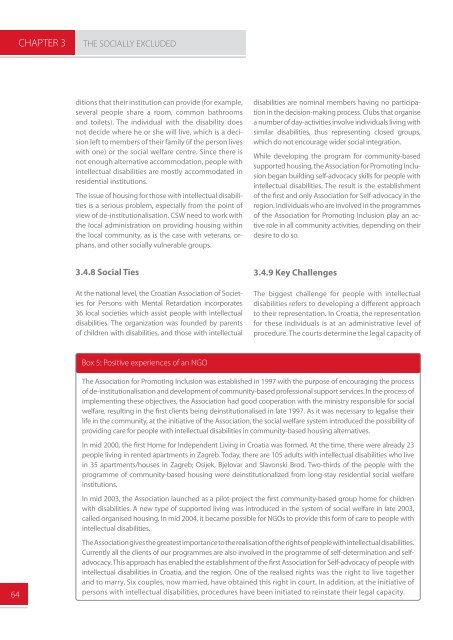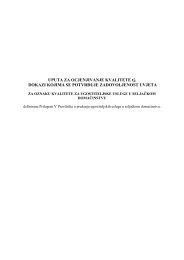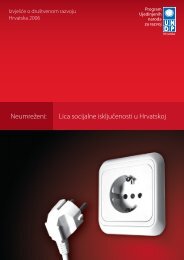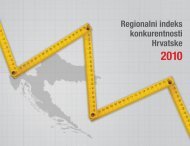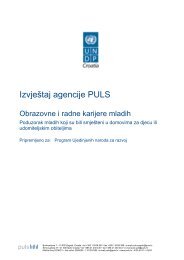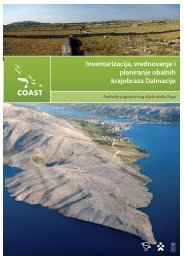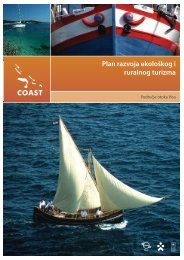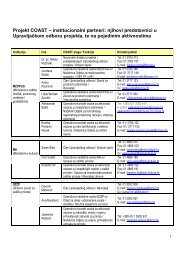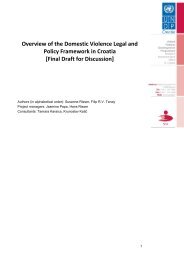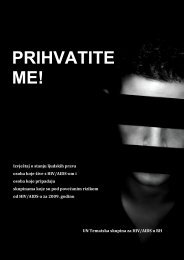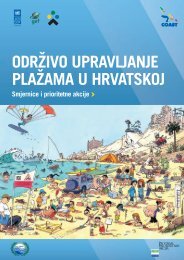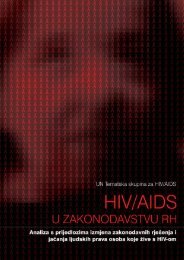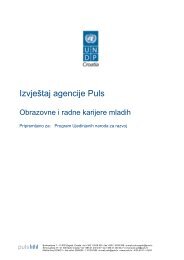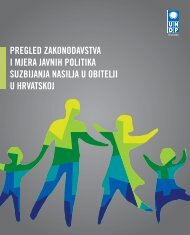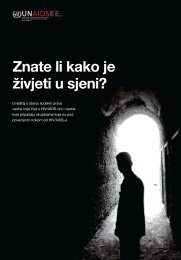WEB engleska verzija end.indd - UNDP Croatia
WEB engleska verzija end.indd - UNDP Croatia
WEB engleska verzija end.indd - UNDP Croatia
- No tags were found...
Create successful ePaper yourself
Turn your PDF publications into a flip-book with our unique Google optimized e-Paper software.
CHAPTER 3THE SOCIALLY EXCLUDEDditions that their institution can provide (for example,several people share a room, common bathroomsand toilets). The individual with the disability doesnot decide where he or she will live, which is a decisionleft to members of their family (if the person liveswith one) or the social welfare centre. Since there isnot enough alternative accommodation, people withintellectual disabilities are mostly accommodated inresidential institutions.The issue of housing for those with intellectual disabilitiesis a serious problem, especially from the point ofview of de-institutionalisation. CSW need to work withthe local administration on providing housing withinthe local community, as is the case with veterans, orphans,and other socially vulnerable groups.disabilities are nominal members having no participationin the decision-making process. Clubs that organisea number of day-activities involve individuals living withsimilar disabilities, thus representing closed groups,which do not encourage wider social integration.While developing the program for community-basedsupported housing, the Association for Promoting Inclusionbegan building self-advocacy skills for people withintellectual disabilities. The result is the establishmentof the first and only Association for Self-advocacy in theregion. Individuals who are involved in the programmesof the Association for Promoting Inclusion play an activerole in all community activities, dep<strong>end</strong>ing on theirdesire to do so.3.4.8 Social TiesAt the national level, the <strong>Croatia</strong>n Association of Societiesfor Persons with Mental Retardation incorporates36 local societies which assist people with intellectualdisabilities. The organization was founded by parentsof children with disabilities, and those with intellectual3.4.9 Key ChallengesThe biggest challenge for people with intellectualdisabilities refers to developing a different approachto their representation. In <strong>Croatia</strong>, the representationfor these individuals is at an administrative level ofprocedure. The courts determine the legal capacity ofBox 5: Positive experiences of an NGOThe Association for Promoting Inclusion was established in 1997 with the purpose of encouraging the processof de-institutionalisation and development of community-based professional support services. In the process ofimplementing these objectives, the Association had good cooperation with the ministry responsible for socialwelfare, resulting in the first clients being deinstitutionalised in late 1997. As it was necessary to legalise theirlife in the community, at the initiative of the Association, the social welfare system introduced the possibility ofproviding care for people with intellectual disabilities in community-based housing alternatives.In mid 2000, the first Home for Indep<strong>end</strong>ent Living in <strong>Croatia</strong> was formed. At the time, there were already 23people living in rented apartments in Zagreb. Today, there are 105 adults with intellectual disabilities who livein 35 apartments/houses in Zagreb; Osijek, Bjelovar and Slavonski Brod. Two-thirds of the people with theprogramme of community-based housing were deinstitutionalized from long-stay residential social welfareinstitutions.In mid 2003, the Association launched as a pilot-project the first community-based group home for childrenwith disabilities. A new type of supported living was introduced in the system of social welfare in late 2003,called organised housing. In mid 2004, it became possible for NGOs to provide this form of care to people withintellectual disabilities.64The Association gives the greatest importance to the realisation of the rights of people with intellectual disabilities.Currently all the clients of our programmes are also involved in the programme of self-determination and selfadvocacy.This approach has enabled the establishment of the first Association for Self-advocacy of people withintellectual disabilities in <strong>Croatia</strong>, and the region. One of the realised rights was the right to live togetherand to marry. Six couples, now married, have obtained this right in court. In addition, at the initiative ofpersons with intellectual disabilities, procedures have been initiated to reinstate their legal capacity.


